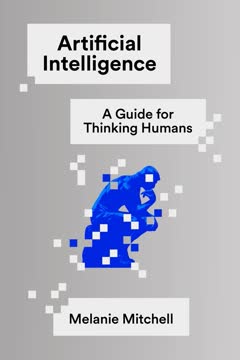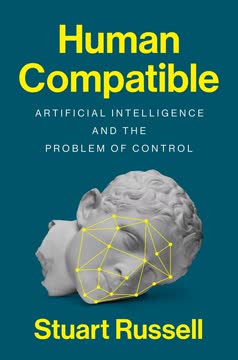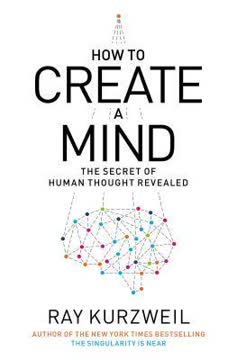Key Takeaways
1. The Law of Accelerating Returns: Exponential Growth in Technology
"The primary issue is not the mass of the Universe, or the possible existence of antigravity, or of Einstein's so-called cosmological constant. Rather, the fate of the Universe is a decision yet to be made, one which we will intelligently consider when the time is right."
Exponential growth in technology. The Law of Accelerating Returns posits that technological progress occurs at an exponential rate, constantly building upon its own increasing order. This principle applies not only to computing power but to all forms of evolutionary processes, including biological evolution and technological development.
Paradigm shifts accelerate. As technology advances, the time between significant breakthroughs shortens. This acceleration is evident in various fields, from the evolution of life on Earth to the rapid development of computer technology. The law predicts that technological growth will continue to accelerate, leading to profound changes in human society and capabilities.
Key implications:
- Technological progress is predictable and inevitable
- The pace of change will continue to increase
- Future developments will occur faster than most people anticipate
- This acceleration will impact all aspects of human life and society
2. The Evolution of Intelligence: From Biology to Technology
"Evolution does not require self-replication. It does not require organisms, either. It does not require DNA or sexual reproduction. The essential requirement is a pattern that can adapt."
From biology to technology. Intelligence has evolved from simple biological organisms to complex human brains, and now to artificial intelligence. This progression represents a continuation of the evolutionary process, with technology becoming an extension of human intelligence.
Accelerating evolution. While biological evolution took billions of years to produce human-level intelligence, technological evolution is progressing at a much faster rate. This acceleration is due to the ability of technology to build upon itself more rapidly than biological systems.
Stages of intelligence evolution:
- Simple cellular organisms
- Complex multicellular life
- Human-level intelligence
- Artificial narrow intelligence
- Artificial general intelligence
- Superintelligence
3. The Future of Computing: Beyond Moore's Law
"We are just beginning to explore the third dimension in chip design. The vast majority of today's chips are flat, whereas our brain is organized in three dimensions."
Three-dimensional computing. As Moore's Law approaches its physical limits in traditional two-dimensional integrated circuits, the future of computing lies in three-dimensional chip design. This shift will allow for continued exponential growth in computing power beyond the constraints of current technology.
Alternative computing paradigms. Beyond 3D chips, several emerging technologies promise to maintain the exponential growth in computing power. These include quantum computing, molecular computing, and neural computing, each offering unique advantages and potential applications.
Future computing technologies:
- 3D integrated circuits
- Quantum computers
- Molecular and DNA computers
- Neuromorphic chips
- Optical computers
4. The Emergence of Strong AI and Its Implications
"By the end of the twenty-first century, there will be no clear distinction between human and machine intelligence."
The rise of strong AI. As artificial intelligence continues to advance, it will eventually reach and surpass human-level intelligence across all domains. This development, often referred to as strong AI or artificial general intelligence (AGI), will have profound implications for society, economy, and human identity.
Implications of strong AI. The emergence of AGI will lead to rapid advancements in various fields, including scientific research, problem-solving, and creative endeavors. It will also raise important questions about the nature of consciousness, the role of humans in society, and the potential risks associated with superintelligent machines.
Key areas impacted by strong AI:
- Scientific research and discovery
- Economic productivity and job markets
- Healthcare and longevity
- Education and skill acquisition
- Governance and decision-making
5. The Merger of Human and Machine Intelligence
"The emergence of strong artificial intelligence is inevitable. But we still have the power to shape our future technology and our future lives."
Human-machine symbiosis. As AI capabilities grow, the distinction between human and machine intelligence will blur. Neural implants and brain-computer interfaces will allow for direct integration of artificial intelligence into human cognition, enhancing our mental capabilities and allowing for seamless interaction with digital systems.
Enhancing human intelligence. The merger of human and machine intelligence will lead to unprecedented cognitive abilities, including perfect memory recall, rapid skill acquisition, and enhanced problem-solving capabilities. This symbiosis will redefine what it means to be human and push the boundaries of intellectual achievement.
Potential enhancements:
- Augmented memory and recall
- Accelerated learning and skill acquisition
- Enhanced sensory perception
- Direct access to vast knowledge databases
- Improved emotional regulation and mental health
6. The Transformation of Human Bodies and Senses
"We will be able to redesign our bodies using nanotechnology and take full-immersion virtual reality to the extreme—nanobots will shut down signals coming from our 'real' senses and replace them with signals corresponding to a virtual environment."
Nanotech and bioengineering. Advances in nanotechnology and bioengineering will allow for radical modifications to the human body. These technologies will enable the repair and enhancement of existing biological systems, as well as the creation of entirely new capabilities.
Virtual and augmented reality. Immersive virtual reality and augmented reality technologies will become increasingly sophisticated, blurring the line between physical and digital experiences. Eventually, direct neural interfaces will allow for fully realistic virtual experiences indistinguishable from physical reality.
Body modifications and enhancements:
- Nanoscale repair and maintenance of biological systems
- Artificial organs and body parts with superior functionality
- Enhanced sensory capabilities (e.g., infrared vision, ultrasonic hearing)
- Improved physical strength and endurance
- Resistance to disease and aging
7. The Ethical and Philosophical Challenges of Advanced AI
"The subjective experience of machine intelligence is seriously discussed, although the rights of machine intelligence have not yet entered mainstream debate."
AI consciousness and rights. As AI systems become more sophisticated, questions about machine consciousness and the rights of artificial entities will become increasingly pressing. Society will need to grapple with the ethical implications of creating sentient machines and determine their legal and moral status.
Human identity and value. The emergence of superintelligent AI will challenge our understanding of human uniqueness and value. As machines surpass human capabilities in various domains, we will need to redefine our role in society and find new sources of meaning and purpose.
Key ethical questions:
- Can machines be conscious, and how can we determine this?
- Should AI systems have legal rights and protections?
- How do we ensure AI systems are aligned with human values?
- What are the implications of AI surpassing human intelligence?
- How do we maintain human dignity and purpose in an AI-dominated world?
8. The Impact of AI on Society, Economy, and Human Identity
"The question of what it means to be human will become increasingly complicated as we become more and more dependent on artificial intelligence and increasingly merge with it."
Economic disruption. The widespread adoption of AI and automation will lead to significant changes in the job market and economic structures. While many traditional jobs may become obsolete, new industries and roles will emerge, requiring humans to adapt and acquire new skills continuously.
Social transformation. AI will reshape social interactions, governance, and cultural norms. The ubiquity of intelligent systems will change how we communicate, make decisions, and organize our societies. This transformation will require careful consideration of privacy, security, and individual autonomy.
Areas of societal impact:
- Job markets and economic structures
- Education and lifelong learning
- Governance and decision-making processes
- Social relationships and communication
- Privacy and personal data management
9. The Future of Creativity and Art in an AI-Driven World
"There is no effective difference between a world filled with near-infinite artificially created people and the same world filled with an equivalent number of 'real' people."
AI-augmented creativity. As AI systems become more sophisticated in creative tasks, the nature of art and creative expression will evolve. Human artists will increasingly collaborate with AI tools, pushing the boundaries of creativity and challenging our understanding of authorship and originality.
New forms of art and expression. The integration of AI and virtual reality technologies will give rise to entirely new art forms and modes of expression. These may include immersive, interactive experiences that blur the line between creator, artwork, and audience.
Emerging trends in AI-driven art:
- AI-human collaborative art projects
- Generative art and music
- Personalized and adaptive artistic experiences
- Virtual reality and augmented reality art installations
- AI-curated cultural experiences
Last updated:
FAQ
What's The Age of Spiritual Machines about?
- AI Evolution: The book explores the evolution of artificial intelligence and its potential to surpass human intelligence, examining how technology has progressed and predicting future advancements.
- Human-Machine Relationship: Kurzweil discusses the relationship between humans and machines, suggesting that machines will not only replicate but also enhance human intelligence, raising philosophical questions about identity and consciousness.
- Technological Predictions: The author provides a timeline of technological advancements, emphasizing the accelerating pace of change and predicting significant milestones, such as computers matching human brain processing power.
Why should I read The Age of Spiritual Machines?
- Future Technology Insight: The book offers a compelling vision of the future where machines become integral to human life, helping readers understand AI's implications on society and identity.
- Philosophical Exploration: Kurzweil raises important questions about consciousness, identity, and intelligence, providing valuable insights for those interested in technology and philosophy.
- Author's Expertise: Ray Kurzweil, a renowned futurist and inventor, lends credibility to his predictions and analyses, making the book a significant contribution to the field.
What are the key takeaways of The Age of Spiritual Machines?
- Accelerating Returns: Kurzweil introduces the "Law of Accelerating Returns," stating that technological progress is exponential, leading to rapid advancements.
- Human-Level AI: The book predicts machines will achieve human-level intelligence, leading to profound societal changes and the potential for machines to surpass human cognitive abilities.
- Technology Integration: Kurzweil discusses how technology will become an extension of human capabilities, blurring the lines between human and machine and redefining humanity.
What are the best quotes from The Age of Spiritual Machines and what do they mean?
- "The primary political and philosophical issue of the next century will be the definition of who we are.": This highlights existential questions as machines become more intelligent, suggesting an evolving understanding of identity.
- "Computers will achieve the memory capacity and computing speed of the human brain by around the year 2020.": This prediction underscores rapid technological advancement and its implications for human cognition.
- "We like to solve problems, but we don’t want them all solved.": Reflects the paradox of human nature, suggesting that the pursuit of knowledge must be balanced with life's complexities.
What is the Law of Accelerating Returns in The Age of Spiritual Machines?
- Exponential Growth: The law posits that technological progress accelerates over time, leading to rapid advancements and a compounding effect.
- AI Implications: Kurzweil argues this will lead to machines achieving human-level intelligence sooner than expected, with technology learning and adapting at unprecedented rates.
- Historical Context: Supported by historical trends, where each major advancement leads to further innovations, Kurzweil uses this framework to predict future AI developments.
How does Kurzweil define intelligence in The Age of Spiritual Machines?
- Optimal Resource Use: Intelligence is defined as the ability to use limited resources optimally to achieve goals, encompassing cognitive, emotional, and social intelligence.
- Pattern Recognition: A key aspect of intelligence is recognizing patterns and making decisions based on them, crucial for both humans and machines.
- Complexity and Simplicity: Intelligence can be both complex and simple, with simple algorithms leading to intelligent behavior when applied correctly.
What role does evolution play in The Age of Spiritual Machines?
- Evolutionary Algorithms: Kurzweil discusses using evolutionary algorithms to create intelligent machines, mimicking natural selection to evolve solutions.
- Human Evolution: Draws parallels between biological and technological evolution, suggesting machines will develop and improve over time, leading to sophisticated intelligence.
- Learning from Nature: Emphasizes understanding biological processes to inform AI development, creating more effective and adaptable machines.
What are the implications of machines achieving human-level intelligence according to The Age of Spiritual Machines?
- Redefining Humanity: As machines become more intelligent, the definition of humanity will change, raising ethical and philosophical questions about identity and consciousness.
- Employment Impact: Intelligent machines may lead to significant job market changes, with traditional roles becoming obsolete and new forms of employment emerging.
- Potential Collaboration: Rather than replacing humans, intelligent machines could enhance capabilities, leading to advancements in fields like medicine, science, and the arts.
How does Kurzweil address the concept of consciousness in The Age of Spiritual Machines?
- Consciousness in Machines: Explores whether machines can possess consciousness similar to humans, arguing that complex machines may exhibit conscious-like behaviors.
- Philosophical Questions: Raises questions about the nature of consciousness and its replication in machines, discussing identity, self-awareness, and ethical implications.
- Human vs. Machine Consciousness: Suggests machines may achieve a form of consciousness differing from human consciousness, crucial for understanding human-machine relationships.
What advancements in technology does Kurzweil predict for the future in The Age of Spiritual Machines?
- Human Brain Simulation: Predicts machines will match human brain processing power, enabling significant AI and machine learning advancements.
- Quantum Computing: Discusses quantum computing's potential to revolutionize technology, allowing for currently impossible computations and breakthroughs.
- AI Integration: Envisions AI seamlessly integrated into daily life, enhancing human capabilities and transforming industries, redefining human-technology interaction.
What is the concept of "downloading your mind" in The Age of Spiritual Machines?
- Mind Mapping: Discusses scanning a human brain to create a detailed neural map, allowing replication of thoughts and memories in digital format.
- Reinstantiation of Consciousness: Once a mind is downloaded, it can be reinstantiated in a machine, raising questions about consciousness continuity and identity.
- Technological Feasibility: While complex and currently impossible, Kurzweil argues advancements in neuroscience and computing will eventually make this a reality.
How does The Age of Spiritual Machines address the ethical implications of AI?
- Identity and Consciousness: Explores ethical dilemmas surrounding identity when consciousness can be replicated or transferred, questioning what it means to be "you."
- Machine Rights: Raises the question of whether advanced AI should have rights similar to humans, as they become capable of thought and emotion.
- Societal Impact: Critically examines potential societal changes from AI integration, such as job displacement and redefined human roles.
Review Summary
The Age of Spiritual Machines presents Kurzweil's vision of technological advancement, particularly in artificial intelligence. Reviews praise his prescient predictions and thought-provoking ideas about the future of human-machine interaction. Critics note some overly optimistic timelines and question equating computing power with intelligence. The book is seen as a mix of solid concepts and speculative ideas, offering an intriguing, if sometimes controversial, glimpse into potential technological developments. While some predictions have not materialized, readers find value in Kurzweil's exploration of evolving technology and its impact on society.
Similar Books










Download PDF
Download EPUB
.epub digital book format is ideal for reading ebooks on phones, tablets, and e-readers.









